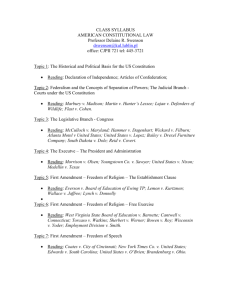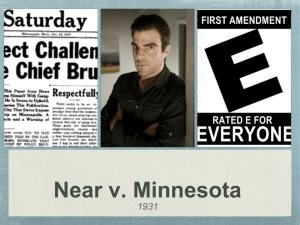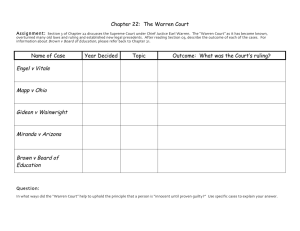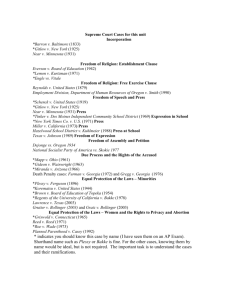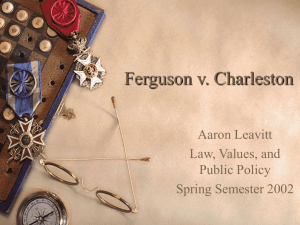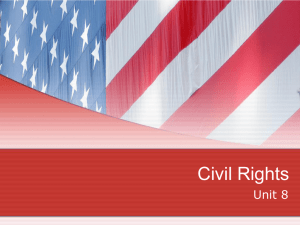civil rights: amendments, cases, & laws
advertisement
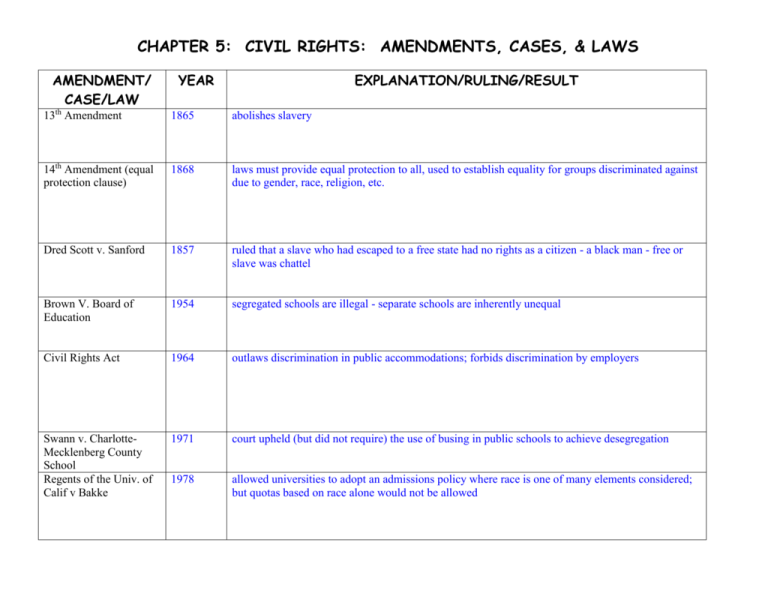
CHAPTER 5: CIVIL RIGHTS: AMENDMENTS, CASES, & LAWS AMENDMENT/ CASE/LAW YEAR EXPLANATION/RULING/RESULT 13th Amendment 1865 abolishes slavery 14th Amendment (equal protection clause) 1868 laws must provide equal protection to all, used to establish equality for groups discriminated against due to gender, race, religion, etc. Dred Scott v. Sanford 1857 ruled that a slave who had escaped to a free state had no rights as a citizen - a black man - free or slave was chattel Brown V. Board of Education 1954 segregated schools are illegal - separate schools are inherently unequal Civil Rights Act 1964 outlaws discrimination in public accommodations; forbids discrimination by employers Swann v. CharlotteMecklenberg County School Regents of the Univ. of Calif v Bakke 1971 court upheld (but did not require) the use of busing in public schools to achieve desegregation 1978 allowed universities to adopt an admissions policy where race is one of many elements considered; but quotas based on race alone would not be allowed AMENDMENT/ CASE/LAW YEAR EXPLANATION/RULING/RESULT 2003 colleges can continue to use race as long as they find less explicit ways to do so than the University of Michigan's undergraduate program, which rewarded minority applicants 20 points on a 100 point scale in the admission process. The Court said that Michigan's goal of a "critical mass" of minorities to ensure diversity was important enough to justify the use of race in admissions. "Korematsu v. United States 1944 upheld the internment of Japanese Americans during WWII Santa Clara Pueblo v. Martinez 1978 court strengthened the tribal power of individual tribe members and furthered self-government by Indian tribes Lawrence v. Texas 2003 court throws out a Texas law that prohibited private homosexual conduct; court found petitioners court based its ruling on a belief in “a realm of personal liberty which the govt. may not enter” and held the petitioners “are entitled to respect for their private lives” Americans with Disabilities Act 1990 requires employers & public facilities to make reasonable accommodations for people with disabilities & prohibits discrimination in the work place Grutter v. Bollinger CHAPTER 5: CIVIL RIGHTS: AMENDMENTS, CASES, & LAWS AMENDMENT/ CASE/LAW 13th Amendment 14th Amendment (equal protection clause) Dred Scott v. Sanford Brown V. Board of Education Civil Rights Act Swann v. CharlotteMecklenberg County Schools Regents of the Univ. of Calif v Bakke YEAR EXPLANATION/RULING/RESULT AMENDMENT/ CASE/LAW Grutter v. Bollinger YEAR 2003 EXPLANATION/RULING/RESULT colleges can continue to use race as long as they find less explicit ways to do so than the University of Michigan's undergraduate program, which rewarded minority applicants 20 points on a 100 point scale in the admission process. The Court said that Michigan's goal of a "critical mass" of minorities to ensure diversity was important enough to justify the use of race in admissions. "Korematsu v. United States Reed v. Reed Equal Rights Amendment (never ratified) --------- Title IX of Civil Rights Act Harris v. Forklift Systems Santa Clara Pueblo v. Martinez Lawrence v. Texas Americans with Disabilities Act 2003 court throws out a Texas law that prohibited private homosexual conduct; court found petitioners court based its ruling on a belief in “a realm of personal liberty which the govt. may not enter” and held the petitioners “are entitled to respect for their private lives”


